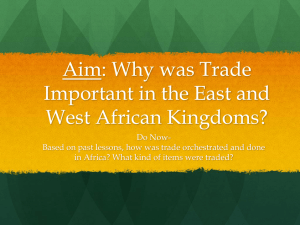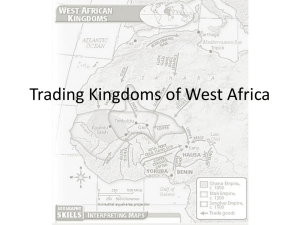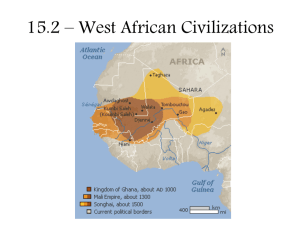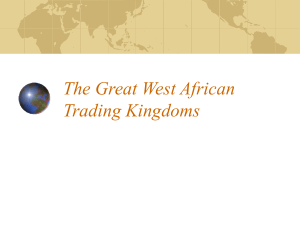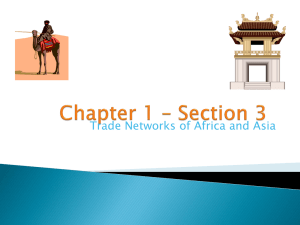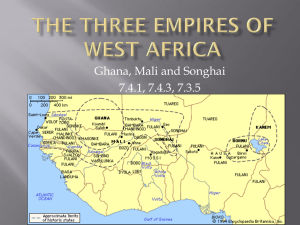African Civilizations WS
advertisement
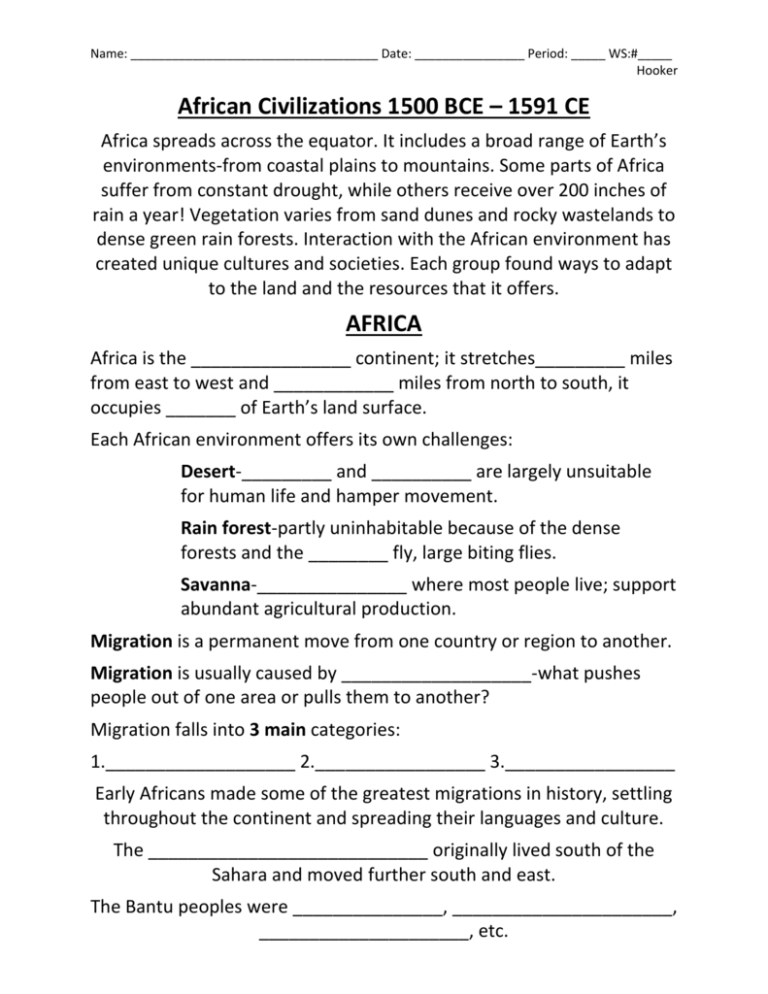
Name: ____________________________________ Date: ________________ Period: _____ WS:#_____ Hooker African Civilizations 1500 BCE – 1591 CE Africa spreads across the equator. It includes a broad range of Earth’s environments-from coastal plains to mountains. Some parts of Africa suffer from constant drought, while others receive over 200 inches of rain a year! Vegetation varies from sand dunes and rocky wastelands to dense green rain forests. Interaction with the African environment has created unique cultures and societies. Each group found ways to adapt to the land and the resources that it offers. AFRICA Africa is the ________________ continent; it stretches_________ miles from east to west and ____________ miles from north to south, it occupies _______ of Earth’s land surface. Each African environment offers its own challenges: Desert-_________ and __________ are largely unsuitable for human life and hamper movement. Rain forest-partly uninhabitable because of the dense forests and the ________ fly, large biting flies. Savanna-_______________ where most people live; support abundant agricultural production. Migration is a permanent move from one country or region to another. Migration is usually caused by ___________________-what pushes people out of one area or pulls them to another? Migration falls into 3 main categories: 1.___________________ 2._________________ 3._________________ Early Africans made some of the greatest migrations in history, settling throughout the continent and spreading their languages and culture. The ____________________________ originally lived south of the Sahara and moved further south and east. The Bantu peoples were _______________, ______________________, _____________________, etc. Name: ____________________________________ Date: ________________ Period: _____ WS:#_____ Hooker WESTERN AFRICAN KINGDOMS 1.__________________ 2.__________________ 3._________________ GHANA Many trade routes crossed the savanna through the region farmed by the _____________________people. The Soninke called their leader Ghana, or war__________________. By the 700s, Ghana was a kingdom, and its rulers were growing rich by taxing the goods that traders carried through their territory. The two most important trade items were ___________ and ________. Gold came from a forest region between the _________ and ________ Rivers. Salt came from the Sahara Desert. The king of Ghana: By 800, Ghana had become an empire. 1 Controlled trade by storing large amounts of gold and salt that only he had the power over. 2 Commanded a large army 3 Demanded taxes and gifts from chiefs of surrounding lands, and would allow them to live in peace if payments were made, 4 And acted as a religious leader and the chief judge Ghana developed in West Africa between the____________ and the ___________Rivers. It was an important kingdom there from about 300 CE to about 1100 CE. The rivers helped Ghana to grow rich because they were used to transport___________ and develop ______________. Ghana also collected _______________ from traders who passed through the kingdom. The people called their nation_______________; we know it as Ghana --that was the word for _____________________. Name: ____________________________________ Date: ________________ Period: _____ WS:#_____ Hooker The kingdom of Ghana probably began when several clans of the Soninke people of West Africa came together under the leadership of a great king named ______________________________. Ghana had few natural resources except __________ and __________. They were also very good at making things from _________________. Ghanaian warriors used iron tipped spears to subdue their neighbors, who fought with weapons made of _______, ________, and ________. Ghana became a ______________ and ___________________ nation, especially when the ______________ began to be used as a source of transport. Ghana relied on trade and their trade was made faster and better with the use of the _______________________. After 700 CE, the religion of ______________ began to spread over northern Africa. Followers of this religion are called ____________. Muslim warriors came into Ghana and fought with the non-Islamic people there. Local warriors then decided to break away from the power of Ghana and form their own local kingdoms. This ended many of the trade networks and eventually weakened the civilization of Ancient Ghana. MALI By 1235 the kingdom of _____________ had emerged. Its founders were ________________________________________, who lived south of Ghana. Mali’s wealth was also built on ________________. A powerful king named ______________ruled Mali from around 12301255 AD. He became known as a _____________, or emperor. He led the people in conquering and expanding his kingdom to be as great as Ghana had been. Name: ____________________________________ Date: ________________ Period: _____ WS:#_____ Hooker Mali had ____ rulers in the ____ years between __________________ and _____________________. Perhaps the greatest king of Mali was ________________ (1312-1337). He developed the gold and salt trade of Mali and his kingdom became very powerful and rich. Mansa Musa was a Muslim; he built many beautiful ______________, or Islamic temples in western Africa as well as attending public prayers, and supporting holy men. In 1324 Mansa Musa made a ________________, or pilgrimage ( a journey to a holy place) to Mecca, which is a holy city in Arabia. He traveled with ___________ servants and followers and ____ camels carrying more than _________ pounds of gold to be distributed among the poor. Of the ________ servants ______carried a staff of pure gold. This showed his power and wealth to the other people he visited. After returning he ordered mosques to be built in the major cities of ______________________ and _____________. When Mansa Musa died there were no kings as powerful as he was to follow. The great kingdom of Mali weakened. Eventually a group of people known as _____________ came into the area and other people came up from the south to claim territory that was once part of the kingdom. Although Mali fell, another advanced African kingdom took its place, the kingdom of ____________________. SONGHAI As Mali declined in the 1400s, people under its control began to break away. Among these were the _______________ people to the east. They built up an army, extended their territory to the _____________, and gained control of important trade routes. Name: ____________________________________ Date: ________________ Period: _____ WS:#_____ Hooker The Songhai had two very important leaders, ______________________ and __________________________. _____________________saw that the kingdom of Mali was weakening and he led his soldiers to conquer the area. He began the kingdom of _______________________. He also set up a complex government to rule all the lands he had conquered. Sunni Ali died in ___________. His son took over the rule of Songhai but he did not accept Islam as a religion. One of Sunni Ali’s generals, named _____________________, overthrew the new king and made himself king of Songhai. He was a follower of ___________ and continued with ____________ as the religion of his kingdom. Songhai remained a ___________ and ____________ kingdom under ___________________________ rule. It had a complex government centered in the city of ________, and great centers of learning. In the late 1500s, ____________________ invaded Songhai to take its rich trade routes. Moroccans had a new weapon, ______________, and the army of Songhai did not. This led to the fall of Songhai. Name: ____________________________________ Date: ________________ Period: _____ WS:#_____ Hooker

